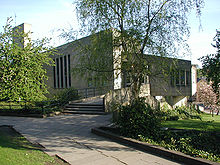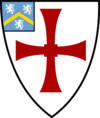Durham Students' Union
Coordinates: 54°46′24″N 1°34′18″W / 54.77333°N 1.57167°W
 | |
| Institution | Durham University |
|---|---|
| Location | Dunelm House, Durham, United Kingdom |
| Established | 1899 as Durham Students Representative Council |
| Sabbatical officers |
|
| Members | c. 17,500 |
| Affiliations | National Union of Students, |
| Website | Durham Students' Union homepage |
Durham Students' Union (DSU) is the students' union of Durham University in Durham, England. It is an organisation, originally set up as the Durham Colleges Students’ Representative Council in 1899 and renamed in 1969, with the intention of representing and providing welfare and services for the students of the University of Durham.
Location[]

The Students' Union occupies and manages Dunelm House, a university-owned building in the centre of Durham where a wide variety of student activities take place. Designed by Architects Co-Partnership, the Brutalist, angular concrete building was completed in 1966 under the supervision of architect Sir Ove Arup, whose Kingsgate Bridge, adjacent, opened two years earlier. Built into the steeply sloping bank of the River Wear, Dunelm House is notable internally for the fact that the main staircase linking all five levels of the building runs in an entirely straight line. This was intended by the building's architects to create the feeling of an interior street.[2]
In 1968 Dunelm House won a Civic Trust award,[3] though it has been described by students as "The ugliest building in Durham".[4] On the other hand, Sir Nikolaus Pevsner, the noted architecture historian, considered the building, "Brutalist by tradition but not brutal to the landscape ... the elements, though bold, [are] sensitively composed."[2] Durham City Council's Local Plan notes that the "powerful" building, together with Kingsgate Bridge, "provides an exhilarating pedestrian route ... out into open space over the river gorge".[5]
Services[]
Welfare[]
The SU provides a number of student welfare services, in addition to those provided by the University. To that end, it employs full-time trained advisers who work in the Advice Centre, runs the Nightbus that ensures students can get home safely and organises "associations" for specific minority groups of students whose interests are deemed to require additional non-collegiate provision. There are currently five associations - Mature, International, LGBT+, People of Colour and Students with Disabilities.
Social events[]
During the late 1960s and the 1970s Dunelm House was a popular music venue, hosting bands including Pink Floyd, Wishbone Ash and Procol Harum. According to their drummer Simon Kirke, Free's most popular song All Right Now was written by bassist Andy Fraser and singer Paul Rodgers in their dressing room in Dunelm House, after a set of slower material had failed to excite the audience.[6]
The SU organises Freshers' Week activities at the beginning of the year, as well as hosting social events for student groups and organizations throughout the year.
Societies[]
Durham Students' Union is notable for the high number of ratified societies it supports. There are currently over 250 registered student groups. A full and up-to-date list of the Durham SU's societies can be found on the Durham Students' Union website.
DUCK[]
Unlike many students' unions, Durham Students' Union does not have "RAG week", but instead, DUCK - Durham University Charities' Kommittee - organises charitable events and activities throughout the year. DUCK was started after RAG week was banned in 1977 following the digging up of the St Aidan's steps as a RAG week stunt. A new name was agreed to allow the fundraising element of RAG to continue. A story recently discovered in the Durham SU archive relates that in 1978 DUCK held a competition to find the most unpopular student in Durham with the intention of throwing them in the river. At the time the story went to print the student officers were the front runners[citation needed].
DUCK was formed in the 1970s to raise money for local, national and international charities. It runs a number of expeditions to destinations including India, Kilimanjaro and Jordan.
Relation to colleges[]
Durham University is a collegiate university and therefore the role of the central students' union is different from most other universities. Each of Durham's colleges has its own student representative body, known in most colleges as the Junior Common Room, which provides services and organises events within the college; while many decisions within the central Students' Union are made with the involvement of JCR SU Representatives.[7] Recently, a small number of the JCRs have opted to disaffiliate from the students' union - including University College[8] and Hild Bede[9] - following the controversial 2020 officer and trustee elections.[10]
Future[]
The announcement in early 2005 that Durham SU had been operating with a large annual loss has prompted serious debate on the future of the organisation and the building in which it is currently based. According to Durham's student newspaper, Palatinate, Durham SU's debt to the bank and its parent institution stood at £303,000 in June 2005. Restructuring of the organisation followed and resulted in a small surplus being posted for the year 2005/06. In 2007/08 a reorganisation took place, which resulted in the adoption of a new constitution. Governance of Durham SU was also updated with the introduction of a Board of Trustees consisting of the five student officers, four elected student trustees and five co-opted trustees.
On a number of occasions, some have suggested have that Durham SU might disaffiliate from the NUS,[11] however until 2009 none of those opposed to affiliation had pushed the issue to a full student debate and vote. In 2009 however, a referendum took place proposing that Durham SU should stay affiliated to the NUS. Students voted convincingly in favour of affiliation with 80% (2564) of students who voted voting to stay affiliated and 20% (624) voting to disaffiliate.[12]
Shortly after this, controversy arose regarding a planned debate, "Multiculturalism in Britain", at the Durham Union Society, which was to involve a recently elected BNP MEP, and which was subsequently cancelled over alleged fears for student safety, reopened the issue of NUS affiliation. A petition for a second referendum was put before the Union [13] and on 12 March 2010, the referendum concluded with a majority of voting students voting to disaffiliate from the NUS,[14] meaning that Durham Students' Union disaffiliated from the NUS after the end of the 2009-2010 academic year.[15]
A third referendum on NUS affiliation was held in January 2011 with 60% of students voting to reaffiliate with NUS.[16]
Currently, there is an ongoing controversy surrounding the results of the 2020 election, with 58% of votes for Re-Open Nominations being cast aside as a result of rule breaches by the Re-Open Nominations campaign.[17] The Re-Open Nominations campaign faced accusations of racism and after the election has been cited as the cause of a spike in racist online abuse.[18] Several college Common Rooms have chosen to 'disaffiliate', 'disassociate' or 'disengage' from the Students Union citing the decision to dismiss Re-Open Nominations.[8][9]
Notable former officers[]
A number of notable figures have been involved in Durham Students' Union in the past. These include:
- Andrew McFarlane (judge), former President
- Michael Izza, former President
- Mo Mowlam, former Deputy President (Education and Welfare)
- Jeremy Vine, former Editor of Palatinate
- George Alagiah, former Editor of Palatinate
References[]
- ^ "Student Officers". Durham SU. Durham SU. Retrieved 25 October 2016.
- ^ Jump up to: a b Pevsner, Nikolaus, The Buildings of England: County Durham (2nd ed. 1983, revised by Elizabeth Williamson), Harmondsworth, Middlesex: Penguin Books Ltd, pp.233-234
- ^ Architects Co-Partnership, "Awards and Commendations" Archived 2007-09-28 at the Wayback Machine, accessed 28 October 2006
- ^ The Tab Durham, "We asked people what they thought of the DSU building", accessed 25 October 2016
- ^ Durham City Council, City of Durham Local Plan, accessed 5 November 2006
- ^ Mckay, Neil (5 November 2008). "All Right Now for Free tribute show". The Journal. Newcastle.
- ^ Durham University Website, Wider Student Experience, Accessed 17th February 2021 https://www.dur.ac.uk/experience/additionalcharges/
- ^ Jump up to: a b Luke Power, https://www.palatinate.org.uk/castle-jcr-votes-to-disaffiliate-from-the-su/
- ^ Jump up to: a b Toby Donegan-Cross, https://www.palatinate.org.uk/hild-bede-src-votes-to-disaffiliate-from-dsu/
- ^ Imogen Usherwood and Tom Mitchell, https://www.palatinate.org.uk/58-of-votes-for-ron-as-dsu-releases-election-results/
- ^ Hannah Costigan, "Durham to pull out of NUS"[permanent dead link], Palatinate, accessed 28 October 2006
- ^ [1][permanent dead link] DeVote online voting system, accessed 27 November 2009
- ^ Vincent McAviney & Jodie Smith, "Security concerns stifle free speech" Archived 2010-10-30 at the Wayback Machine, Palatinate, accessed 8 February 2010
- ^ "Archived copy". Archived from the original on 2010-08-14. Retrieved 2010-08-14.CS1 maint: archived copy as title (link) DeVote online voting - Results
- ^ Ben Robertson,"NUS Referendum Results Announced"
- ^ DeVote Online Voting Archived 2011-06-29 at the Wayback Machine
- ^ Jack Parker and Toby Donegan-Cross, https://www.palatinate.org.uk/breaking-su-declares-election-results-after-ron-disqualified/
- ^ Nichola Vo, https://www.palatinate.org.uk/no-one-wants-to-be-called-racist-durhams-need-for-change/
External links[]
- Students' unions in England
- Clubs and societies of Durham University

